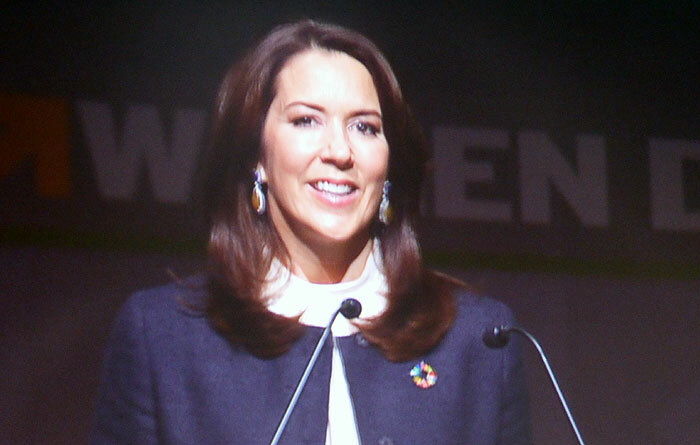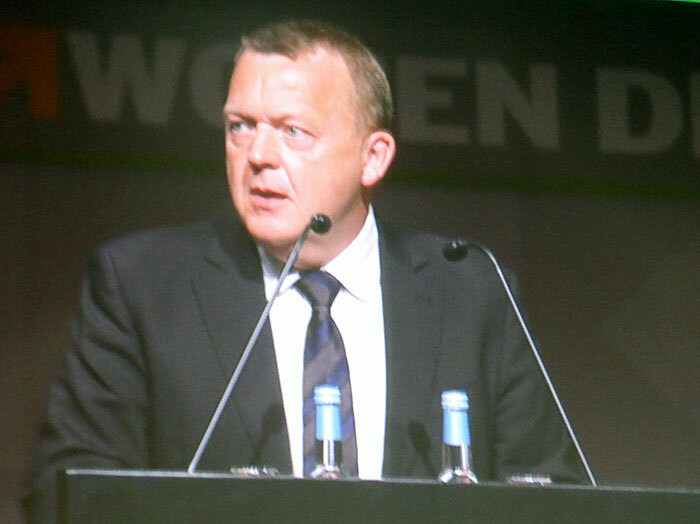Deliver for girls, deliver for good
May 18, 2016
Some 5,500 delegates are meeting in Copenhagen to share experiences and deliberate on solutions for girls and women.

"Girls and women carry more than babies. Or water. They carry families. They carry businesses. They carry potential. And when we invest in their health, rights and wellbeing, it creates a positive ripple effect that lifts up entire countries."
This paragraph from the Women Deliver Commitment, for a new campaign, Deliver for Good is the thread in the conversation at Women Deliver's fourth global conference, meeting in Copenhagen, Denmark this week.
Over 5,500 delegates including policy makers, parliamentarians, development workers, donors and advocates from 169 countries, representing over 2500 organisations are in Copenhagen to share experiences and deliberate on solutions for girls and women in the era of the Sustainable Development Goals.
Opening the conference on Monday, Princess Mary, the crown princess of Denmark underlined that achieving transformative change and results across all 17 sustainable development goals was dependent on the realisation of gender equality and significant progress for girls and women.
"We all share a common conviction that girls and women are the key to building prosperous, sustainable and healthy societies and communities," she said.
She described girls and women as the world's greatest untapped resource.
"When we invest in women, society as a whole benefits," she said.
Princess Mary (below, pictured on screen) decried the high number of maternal and new-born deaths describing maternal mortality as "one of the horribly unjust symptoms of inequality and lack of respect for the human rights of women and girls."

Over 300,000 women die from pregnancy-related causes globally and five million babies die during birth or in their first weeks of life.
"It angers me that 90% of existing maternal and new-born deaths can be prevented with access to skilled birth attendants," she said.
She applauded the Women Deliver conference for highlighting the issue and emphasized the need for strong leadership from government and civil society in getting commitment and results.
She outlined the private sector role in investment to address the challenges, the involvement of the youth and the need to work together on innovative and new solutions to modify, add value and scale evidence based solutions that work.
"This agenda is not a women's agenda but a united agenda for humanity that involves men, women, girls and boys," she said to a thunderous applause.
Dr Babatunde Osotimehin, the UNFPA Executive Director called on everybody's involvement in protecting girls and making sure they can reach full potential.
He highlighted the challenge of addressing child marriage noting that though every country in the world has adopted 18 years as the age of marriage there is impunity everywhere.
"We have senators in my country who marry 12 year olds. So in a sense it is our ability to hold people accountable to the laws of the land. Society has a role to play," he said.
Dr. Sakena Yacoobi, the CEO and founder of Afghan Institute of Learning, who has educated thousands of girls in what many, would consider a hostile environment to girls' education emphasised the need for education in addressing ignorance and changing the wellbeing of women and their families.
She spoke of innovative ways of reaching women and girls, giving an example of how she has extended family planning and reproductive health information to couples through religious leaders.
Tawakkol Karman the young, bold and vocal Nobel Peace Prize laureate, who has led a non-violent struggle for women's rights to full participation in peace-building in Yemen, emphasised the need to address all the SDGs especially that of reducing poverty as a way of empowering women.
Denmark's Prime Minister, Lars Løkke Rasmussen (below) said the fight for gender equality was a fight for both men and women.

He said equal gender opportunities create a path for economic development and social wellbeing for everybody.
He described Denmark as one of the most educated, just and happiest countries and attributed its current status to women getting equal rights and opportunities.
Katja Iversen the Executive Director of Women Deliver's story lit a glimmer of hope for change. Only two generations ago in Denmark, her grandmother could not go to school so that she (the grandmother) could work to send her brothers and husband to school; the grandmother could not get contraception because she was not married and when the husband finally completed his education, a teacher's wife could not work.
But her grandchild today leads the global movement that is changing the landscape for better opportunities for women and girls all over the world.
It is therefore not hard to imagine the potential, millions of women and girls who at the moment only carry babies, water or firewood from dawn to dusk, would bring to the world two generations from now if only the world could deliver for them in health, education and wellbeing for certainly they will deliver for good.
